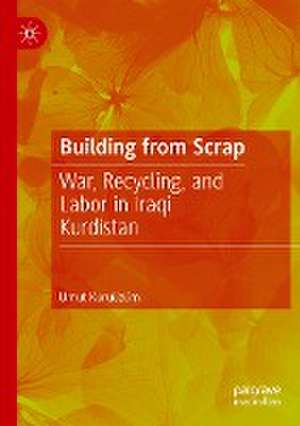Building from Scrap: War, Recycling, and Labor in Iraqi Kurdistan
Autor Umut Kuruüzümen Limba Engleză Paperback – 25 mai 2023
Preț: 411.77 lei
Nou
Puncte Express: 618
Preț estimativ în valută:
78.85€ • 81.33$ • 65.35£
78.85€ • 81.33$ • 65.35£
Carte tipărită la comandă
Livrare economică 21 februarie-07 martie
Preluare comenzi: 021 569.72.76
Specificații
ISBN-13: 9783030922221
ISBN-10: 3030922227
Pagini: 203
Ilustrații: XI, 203 p. 28 illus. in color.
Dimensiuni: 148 x 210 mm
Greutate: 0.26 kg
Ediția:1st ed. 2022
Editura: Springer International Publishing
Colecția Palgrave Macmillan
Locul publicării:Cham, Switzerland
ISBN-10: 3030922227
Pagini: 203
Ilustrații: XI, 203 p. 28 illus. in color.
Dimensiuni: 148 x 210 mm
Greutate: 0.26 kg
Ediția:1st ed. 2022
Editura: Springer International Publishing
Colecția Palgrave Macmillan
Locul publicării:Cham, Switzerland
Cuprins
Chapter 1: Relating Capital in Iraqi Kurdistan.- Chapter 2: Industrial Conversion.- Chapter 3: Recycling War Scrap.- Chapter 4: Reconstructing Iraqi Kurdistan.- Chapter 5: Capitalization of Migrants.- Chapter 6: Relating Insecurities.- Chapter 7: Uneven Independence.
Notă biografică
Umut Kuruüzüm is Assistant Professor of cultural economics at Istanbul Technical University, Turkey, who has been working on war economies, ruination, waste, recycling industries, and labor in the contemporary Middle East. He is a London School of Economics (MSc, PhD) trained economic anthropologist, and he is currently leading a research project on plastic pollution, toxicity, and the inequalities of climate change on the north-eastern Mediterranean coast.
Textul de pe ultima copertă
This book is about the flourishing scrap recycling industry, reconstruction, and state-making in Iraqi Kurdistan within the wider conditions of the war economy, ruination, and state disintegration in Iraq. Through a dialectical relationship between the afterlife and continuity of war over distinct but conjoined landscapes, it examines industrial work, labouring, and statelessness on a frontier territory near the self-proclaimed Islamic State (ISIS). By documenting the advance of the global steelmaking industry, the spread and erosion of selective state sovereignty, and the struggle of dispossessed workers, the book sketches the economic geography of a contemporary market expansion over the northeast of Iraq in a relational and dynamic way.
Umut Kuruüzüm is Assistant Professor of cultural economics at Istanbul Technical University, Turkey, who has been working on war economies, ruination, waste, recycling industries, and labor in thecontemporary Middle East. He is a London School of Economics (MSc, PhD) trained economic anthropologist, and he is currently leading a research project on plastic pollution, toxicity, and the inequalities of climate change on the north-eastern Mediterranean coast.
Caracteristici
First comprehensive ethnographic analysis of Kurdish industrial capitalism Takes a relational, holistic, and historical materialist approach in documenting empirical market building Develops a theoretical model for the relationship between accumulation of cheap resources and statelessness
